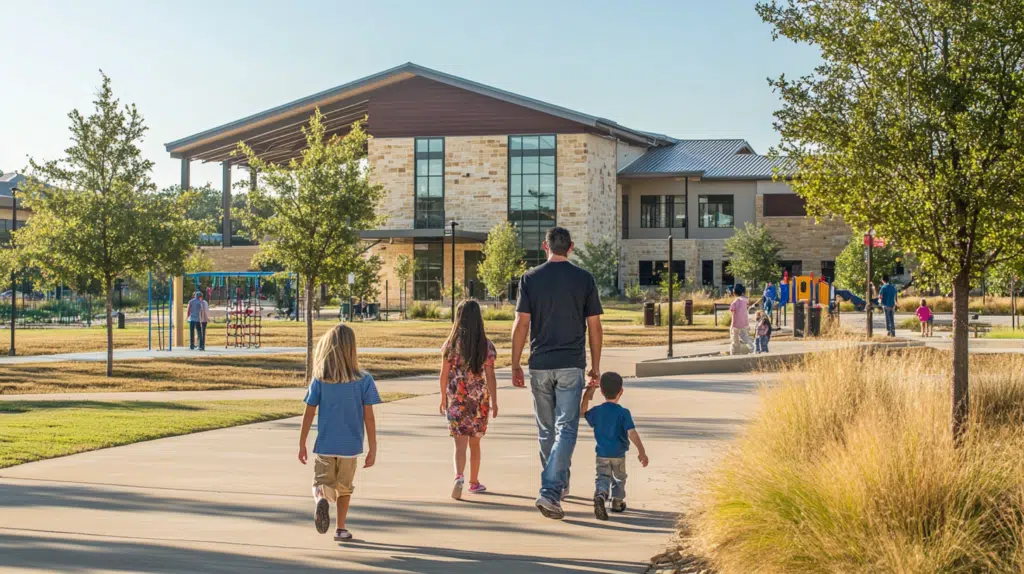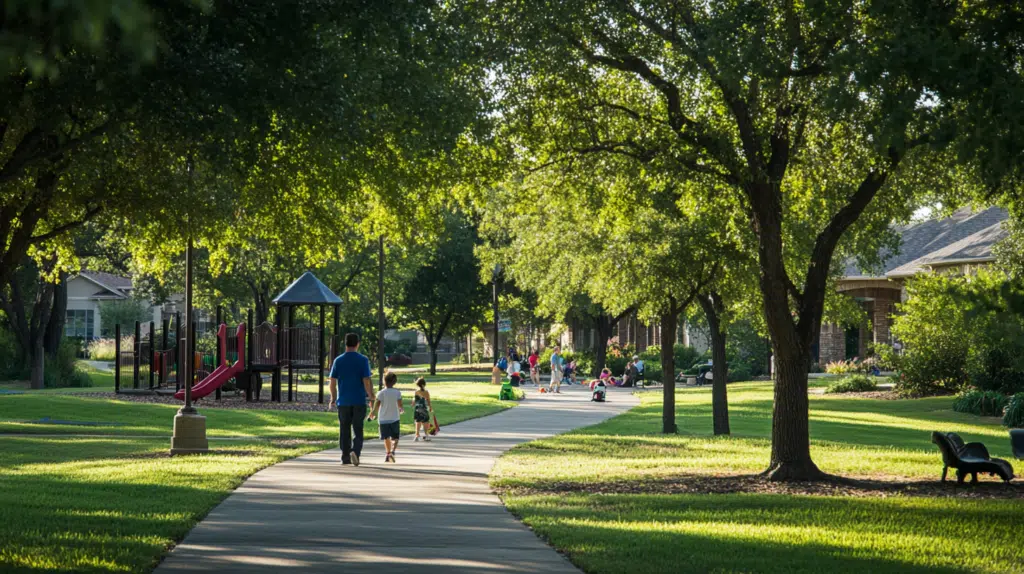Choosing a neighborhood is about more than just finding a house—it’s about creating a place where your family can thrive. From quality schools and safe parks to a supportive community, the right neighborhood provides a foundation for your family’s growth, connection, and well-being. Here’s a guide to help you choose a neighborhood that suits your family’s needs and values, with practical tips and faith-centered considerations for building a home in a place you love.
Every family is unique, and what defines the “right” neighborhood depends on your lifestyle and goals. Consider aspects like commute times, access to schools, and recreational spaces. If faith and community are essential to your family, look for areas with active places of worship and family-oriented events.
Things to Consider:
Faith Insight: Reflect on your family’s core values. Choosing a neighborhood with a supportive community can help you live out those values daily, surrounded by like-minded neighbors who share your commitment to family and faith.

For families with children, school quality is a top priority when choosing a neighborhood. Look into local school ratings, graduation rates, and extracurricular opportunities, as well as the overall environment. Many online resources provide detailed information on school districts, but talking to locals can give you a real feel for the community culture surrounding schools.
Tip: Areas with top-rated schools often retain home value better over time, making them a wise investment. Even if you don’t have children now, a good school district can positively impact your home’s resale value.
Example: The Anderson family moved to [Location] for its well-regarded school district, finding a neighborhood where their children could thrive academically and socially.

Having access to green spaces and recreational areas makes a big difference in a neighborhood’s family appeal. Parks, playgrounds, and nature trails provide spaces for outdoor activities, community events, and family bonding. When exploring neighborhoods, look for well-maintained parks, walking trails, and local gathering spots that encourage a healthy, active lifestyle.
Faith Insight: Spending time in nature brings both peace and connection. Consider a neighborhood that offers space for your family to enjoy the outdoors together, creating memories and moments of gratitude.
Neighborhood Tip: Popular parks and outdoor spaces often host community events, giving your family more opportunities to connect with neighbors and build friendships.
Safety is a priority for every family. Check crime rates and talk to locals or your real estate agent for a realistic sense of a neighborhood’s safety. Walkability is also a key factor, especially if you prefer being able to stroll to nearby amenities like parks, grocery stores, or schools. A walkable neighborhood often enhances your daily quality of life and makes running errands or getting outside easy.
Questions to Ask:
Faith Insight: As you explore safety in a neighborhood, remember to pray for guidance, asking for a place that provides both peace of mind and a sense of belonging.
Every neighborhood has its own culture and vibe, from tight-knit communities with active social calendars to quieter areas where residents keep to themselves. Consider whether the community has family-friendly events, local festivals, and opportunities to get involved. If faith-centered gatherings or community service are important, look for a neighborhood that aligns with your family’s interests.
Example: Jessica and Michael were looking for a neighborhood where their children could make friends and participate in community events. They chose [Neighborhood Name] because it offered seasonal festivals, family-friendly gatherings, and an active local church community.
Faith Insight: A close community that values connection and kindness can be a powerful support system. A neighborhood where families gather, celebrate, and help one another fosters a spirit of unity and friendship.
For families who value faith as part of daily life, nearby places of worship play an important role. Explore local churches, synagogues, or community groups to see if the neighborhood offers faith-centered resources that will support your family’s spiritual growth. Some neighborhoods are known for their active faith communities, with churches that host events, youth groups, and family outreach programs.
Faith Insight: Having a supportive faith community close to home provides spiritual support, friendships, and a shared sense of values. A neighborhood with an active faith presence can help strengthen your family’s journey together.
Look into the neighborhood’s proximity to essential services like hospitals, grocery stores, and childcare centers. Having these conveniences nearby simplifies daily routines and ensures you’re prepared for any emergency needs. Access to quality healthcare and other services is a practical consideration that can enhance your family’s well-being.
Practical Tip: Make a checklist of the essential services your family uses regularly and map out how close they are to each neighborhood you’re considering.
Example: For the Thompson family, being close to medical facilities and a grocery store was a priority. They chose [Neighborhood Name] because it allowed them to be near both, making daily routines and emergencies easier to handle.

One of the best ways to understand a neighborhood’s vibe is by speaking with current residents. They can give you a realistic idea of what life is like, share insights into the community culture, and tell you about nearby amenities that may not be immediately obvious. Connecting with locals helps you see if the neighborhood aligns with your family’s lifestyle and goals.
Faith Insight: Building friendships with neighbors who share your values can be a blessing in times of celebration or challenge. When your family lives in a neighborhood where kindness and support are valued, each day feels more connected.
Tip: Attend an open house or a local event, and don’t hesitate to ask neighbors about their experiences and what they love about the area.
Choosing the right neighborhood for your family is a big decision that goes beyond real estate. By focusing on factors like community culture, safety, schools, and access to family-friendly amenities, you’ll find a neighborhood where your family can grow and thrive. Miranda Realty is here to help you make this important choice with confidence, offering expert guidance and faith-centered support throughout the journey.
Miranda Realty Promise: Our team is committed to helping you find a neighborhood that aligns with your family’s needs, values, and future goals.
How do I know if a neighborhood is family-friendly?
Look for areas with parks, good schools, low crime rates, and family-oriented events. Talking to local residents or your real estate agent can also provide insight into a neighborhood’s family appeal.
Why is school quality important even if I don’t have children?
Homes in strong school districts often retain value better over time, and this can make the home a better investment if you decide to sell in the future.
What if I want a neighborhood with a strong faith community?
Many neighborhoods have active churches and places of worship that host events and family activities. Research local faith communities to find one that aligns with your values.
How do I research the safety of a neighborhood?
You can check crime rates online and speak with your real estate agent for local insight. Visiting the neighborhood at different times of the day also helps gauge its atmosphere.
Are there neighborhoods that offer community events and gatherings?
Yes, some neighborhoods host regular family-friendly events, festivals, and community meet-ups. Your agent can help identify areas known for their active community culture.